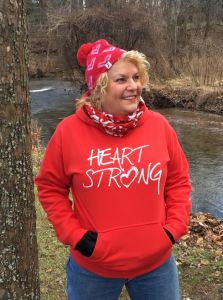A woman who survived a heart attack seeks to increase awareness
By Amanda Jowsey
On the day Bev Timura Pohlit celebrated her 55th birthday, she and her kids joined friends for lunch. The following night, she experienced what felt like acid reflux. Not normally having acid reflux, she found that strange.
“Because of my job, it being very demanding, I didn’t go to the doctor the next day when [the pain] got worse,” Pohlit said.
She felt horrible and tried to sleep. Her husband came in shortly after. She woke up, flung her arm over, hitting him in the chest. “I feel like there is muriatic acid inside my chest. I feel like I am burning up alive!” she said.
That’s when her husband rushed her to the hospital. Pohlit was taken to the heart catheterization lab. Her right coronary artery was 95% blocked. She’d been having a heart attack for five days.

“I gotta tell you the funny part about it,” she laughed. “All of our mothers always told us to change your underwear and brush your teeth and everything before you go to the hospital. Well, I did.”
A nurse told her that she was having a heart attack and to remain very calm.
Prior to this day, she hiked and biked 50 miles a week with her husband. She grew an organic garden, ate organic food, canned organic.
Pohlit was in disbelief.
One of the nurses had to remove Pohlit’s clothes. “By the way,” she told the medical team, “I just want you all to know that I brushed my teeth and those are clean underwear.” She laughed again as she recounted the ordeal.
She overheard the nurses’ admiration of her spitfire spirit. Normally, they are trying to keep the patients going. With Pohlit, it was the other way around.
“But I was scared. I can’t say I wasn’t,” she admitted.
She had two stents put in her heart and was lucky enough not to suffer any permanent damage.
Surviving and sharing
After surviving her heart attack and coming to terms with it, she needed to share her story. She wanted to raise awareness about the No. 1 killer of women above all cancers combined– heart disease.
She co-founded Heart Sisters Heart Attack and Disease Survivors, a support group located in Berks County, Pennsylvania, as well as online. The group “provides hope, information, understanding, compassion, encouragement, comfort and emotional support to women diagnosed with any type of heart disease.”
Women who have suffered from a heart attack or who have any type of heart disease, often lack the resources they need to talk to someone about the life-changing experience. They feel alone, even embarrassed.
Pohlit, like many women, faulted herself. “I believed because there was nothing out there telling women that women had heart attacks, that they were a man’s disease. And that I did something so terribly wrong that I caused my body to have a heart attack,” Pohlit said.
Heart attacks in women increasing
A 2019 study published by the American Heart Association shows the percentage of women (ages 35-54) who are having heart attacks is increasing, more than in young men.
What caused this increase? Cardiologist JoAnne L. Cobler of Buffalo Medical Group believes it’s a combination of factors. Obesity, psychosocial factors, smoking, a lack of physical activity, and poor diets that lead to high blood pressure and high cholesterol. Misconceptions about women and heart disease also play a role.
Cobler believes an imbalance exists between men and women in treating the risks of heart disease.
“In the past, it was felt that heart disease was not a disease of women,” Cobler said. “It was mostly men. Then we started doing more studies and realized that it was more prominent in women as a leading cause of death.”
“Women tend not to be treated as aggressively for their blood pressure and cholesterol, even after a heart attack,” Cobler added. “I do think there’s that mindset that it’s not as important for women as it is for men.”
For most women, heart disease tends to occur later in life, during and after menopause due to changes in estrogen levels. “Now, we have a lot of younger people who are experiencing this, but with them it’s a lifestyle thing,” Cobler said.
Take care of yourself!
The AHA warns, “Most heart disease and stroke deaths are preventable.” Exercise. Follow a low-fat diet. Don’t smoke. Know your family history and make changes accordingly. Take care of your mental and emotional health.
“There are a lot of psychosocial factors that are very important: depression, stress, a history of abuse. Things like that affect women as well, especially at a younger age,” Cobler said.
Many women wait until it’s too late to seek help.
“Listen to your body,” Pohlit said. “If something doesn’t feel right, it’s not right.”
As a mother of two boys, a wife and now a grandmother to her two granddaughters, Pohlit always cared for others.
“That’s kind of me,” Pohlit said. “Take care of everybody else, but I didn’t take care of myself that week.”
Get the word out
Pohlit became so involved in the cause that the AHA asked her to be its national brand ambassador for Shop Heart, the official store of the AHA. Through many campaigns, like the Go Red for Women Campaign, women’s heart disease is getting the attention it needs.
Pohlit said she wants to share hers and other people’s stories to help fight misconceptions surrounding women and heart disease.
![Cardiologist JoAnne L. Cobler of Buffalo Medical Group: “We started doing more studies and realized that [heart disease] was more prominent in women as a leading cause of death.”](https://www.bfohealth.com/wp-content/uploads/2021/11/JoAnneCobler-300x300.png)
